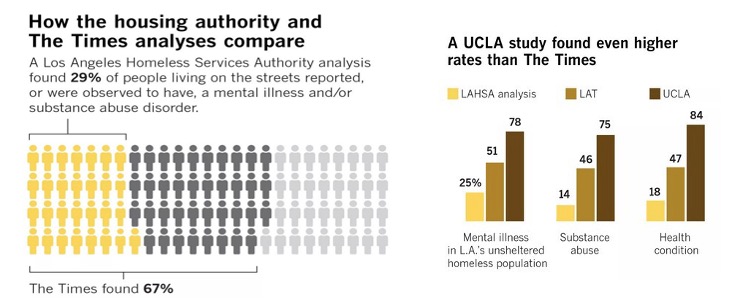Comments
MARK, MY WORDS - Karen Bass came out of the gate espousing the same rhetoric that we have heard for years and citing the same so called “experts” and failed policies that created a multi-billion dollar homelessness crisis. But her worst transgression is the continued propagation of State sponsored sleight of hand, that housing will solve L.A. homelessness. It won’t. Repetition of a message may make it popular, but it won’t make it true.
Los Angeles city officials have downplayed rates of substance addiction and mental illness within the homeless community for years. The reason still eludes me, but I suspect it has something to do with drawing attention away from the extent of the disaster that it really is. Most outside agencies and statistics cite numbers up to more than three times as high. Even the LA Times and UCLA contradict County and City narratives in two 2019 studies.

For the sake of argument, and it is a good one, let us assume that the data from outside of the LA echo chamber is correct or at the very least, more accurate than the politically motivated County and City assessments. What then, does taxpayer funded housing have to do with solving the homeless crisis?
Am I to believe that a person’s addiction to drugs or mental illness can be cured by giving them a house? It’s a valid question and one which must be answered before the battered taxpayers of California are asked to spend another dollar forwarding more failed policy.
The State’s unrelenting efforts to crush the middle class dream of owning a house in a single family neighborhood is bad enough, but calling it a cure for homelessness is particularly despicable and misleading. It is no secret that the cost of living in Los Angeles is unsustainable for most people, but expecting struggling families to pay for over two decades of misdeeds by State, County and City representatives who demonstrate seemingly limitless and rudderless obedience to special interests, is unacceptable.
There is no housing crisis in California, but there most definitely is a cost of living crisis. Expediting building at the cost of reasonable and responsible oversight like CEQA, is a gift from politicians to developers and if the past gives any indication, a prelude to more corruption, lasting infrastructure damage and a worse standard of living for lower income and middle class communities. The free market is impervious to the demands or desires of a Mayor. That is what makes it free, but if we allow bad actors to game the system, we invite it’s inevitable collapse. It is a question of values. What is progress, who does it benefit and who does it harm? Perpetual building and expansion is neither necessary nor possible, but instead, a misleading narrative perpetuated by those who stand to benefit financially and politically. Our infrastructure cannot support the amount of people we have living here now, far less the people and cars that the proposed tens of thousands of homes will bring.
State and municipal governments have created the problem fueled by corruption, incompetence and a campaign of gas-lighting, focusing media attention on politically correct language instead of financially correct policy. If this wasn’t bad enough, they have spent billions while failing to rectify it. Public confidence has long since been eviscerated, and common sense can no longer be ignored or vilified in the name of a convenient pursuit of some twisted interpretation of social justice. Giving more money to the people who already gambled away billions of dollars on nonsensical policies that have consistently proven to be ineffective, is morally and fiscally unacceptable.
Statistics tell part of the story, but the appearance of homelessness is also important. When the State and the City politically manipulate data that contradicts reality, it manifests a dissonance that creates friction and cynicism from those who are told one thing and witness another on a daily basis. Call it what you like- mental illness, alternate forms of perception, creative expression...when we pass people on the street covered in filth and yelling at lamp posts, it is a crisis, not just for society, but for the person who is going through it.
Large numbers of LA homeless repeatedly refuse the services they are offered for a variety of reasons, or fail to stay in provided shelters and programs for any length of time. For the sake of argument though, let’s say they accept the new Mayor’s offer. How does a person who is mentally ill or suffering addiction manage a house or an apartment? They would need to be employable, maintain a job, pay bills, buy food, medication, etc. Even before that, many would need rehab and a carefully monitored medication program. This is an incredibly arduous and expensive task, not to mention the high program-completion failure rate which would necessitate multiple rehabilitation attempts costing billions in funding.
Permanent publicly-subsidized housing is a nonstarter and a bridge too far for the over-burdened, struggling Californian. The time has come for Los Angeles politicians to eat their humble pie, admit that they have no solution and do what constituents and experts have been asking for years:
-Uphold existing law for EVERYONE. Allowing a specific population to subvert basic societal order while expecting another to submit to it, is unconstitutional. Yes, this means that those on the street suffering from illnesses or addictions that prevent them from functioning in public or taking care of themselves, must be institutionalized to get the help they need. Just writing that is emotionally difficult for me, but the alternative is too dangerous, cruel and a cowardly demonstration of non-action by inept and out-of-touch politicians.
-Rebuild and provide mental healthcare facilities to fill the void left from their mass closure following the California State Legislature’s Lanterman-Petris-Short Act in 1967. Citing horrible examples of mental asylums from the past though, should not negate the possibility of building kinder, more effective modern facilities based on updated ideas of mental illness and addiction treatments.
-Finally, stop propagating the idea that homelessness can be solved with publicly funded housing. There is no reliable data to support this assertion, and the long term cost to the public would be astronomical spanning generations. Insisting that Los Angeles grow and modernize at a frenzied rate determined by the politicians, lobbyists and developers who are the sole beneficiaries of such policies, is madness.
The rest of us, homeless or otherwise, will end up being collateral damage.
(Mark Dutton is a lifelong musician, music producer, and writer. He was arguing politics with his parents since he was a pre-teen. Mark majored in psychology and left college in his 3rd year on a 30 year magic bus trip around the world playing and writing music with some of the best in the biz.)
Related:
Are many homeless people in L.A. mentally ill? New findings back the public’s perception
Health Conditions Among Unsheltered Adults in the U.S.
Why Closing U.S. Psychiatric Hospitals Caused a Mental Health Crisis
The American Mental Asylum: A Remnant of History
















